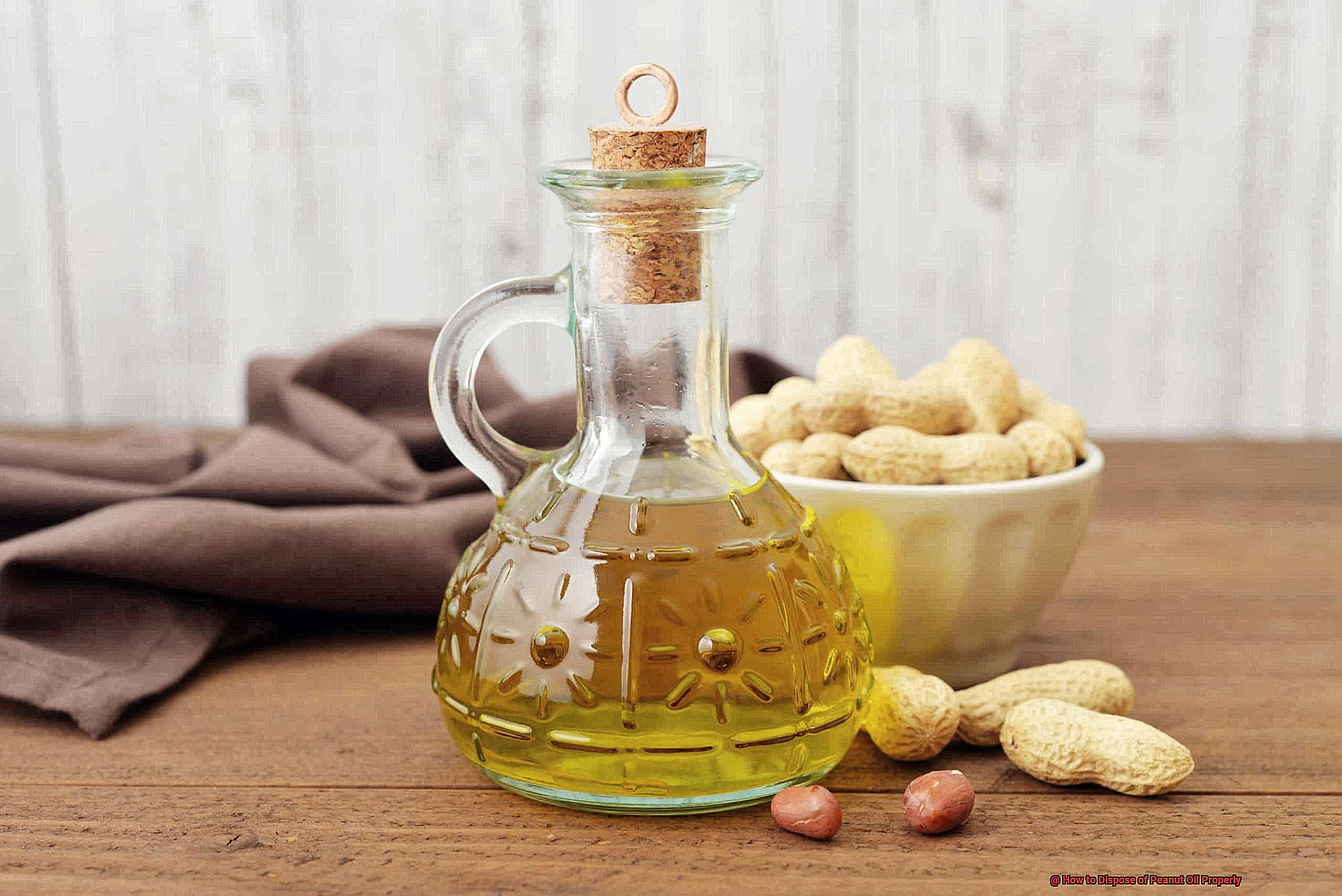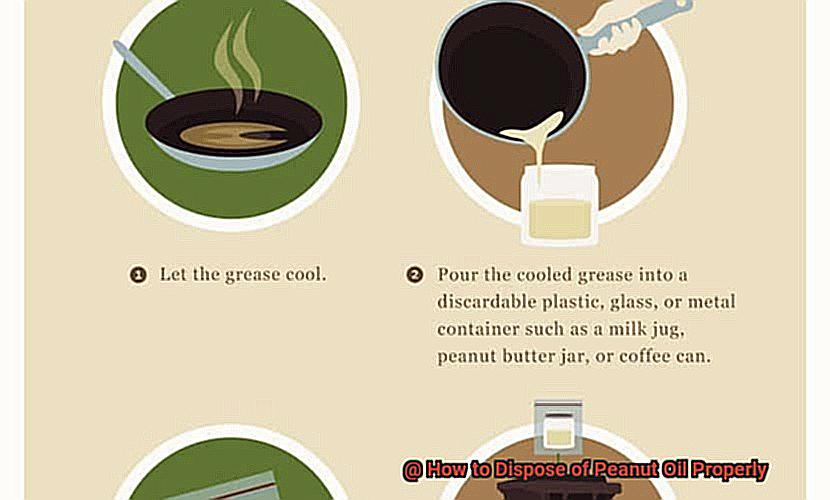Do you love the crispy texture and flavor of deep-fried peanuts?
Of course, who doesn’t. But have you ever thought about what happens to the oil that’s left behind after your peanut-frying extravaganza?
Pouring it down the drain may seem like an easy solution, but it can lead to clogged pipes and other issues. So, what is the proper way to dispose of peanut oil?
Don’t worry; we’ve got you covered. In this blog post, we’ll guide you through the correct way to dispose of peanut oil safely and without harming wildlife or the environment.
We’ll provide you with a step-by-step process for disposing of peanut oil in an eco-friendly manner. But wait, there’s more.
We’ll also explore some clever ways to reuse peanut oil that you may not have considered before. Whether you’re a home cook, restaurant owner, or just someone who enjoys deep-fried peanuts from time to time, this blog post is for you.
So let’s dive right in.
What is Peanut Oil?
Contents
Peanut oil is a type of vegetable oil that is extracted from peanuts.
It’s a popular ingredient in the food industry due to its neutral flavor and high smoke point, making it ideal for snacks, baked goods, and fried foods. But did you know that it’s also rich in monounsaturated fats?
These healthy fats can lower cholesterol levels and reduce heart disease risk. Moreover, peanut oil contains vitamin E, an antioxidant that protects cells from free radicals.
There are two types of peanut oil: refined and unrefined. Refined peanut oil is processed using high heat and chemicals to remove impurities and neutralize any strong flavors.
This process produces a clean, light-colored oil with a neutral taste and a high smoke point. Think of it as a blank canvas – versatile and perfect for various cooking techniques, from baking to frying.
On the other hand, unrefined peanut oil is minimally processed and retains more of its natural flavor and nutrients. Compared to refined peanut oil, it has a darker shade and a nuttier texture.
Unrefined peanut oil is an excellent way to add flavor to dishes such as stir-fries, salad dressings, and marinades. Now, regardless of which type of peanut oil you choose, it’s important to dispose of it properly.
Pouring it down the drain can clog pipes and cause damage to wastewater treatment systems. Let’s be responsible and recycle or dispose of it in a safe manner.
Benefits of Reusing Peanut Oil
Taste
Peanut oil has a high smoking point and a neutral flavor, making it an excellent choice for deep-frying. Did you know that reusing peanut oil can actually enhance the flavor of your food?
When the oil is used once, it absorbs flavors from the food that was cooked in it. This means that if you’re cooking chicken tonight and fish tomorrow, the fish will have a subtle chicken flavor that will make for a unique and delicious experience.
Reusing Peanut Oil
Pouring used cooking oil down the drain can cause serious plumbing problems and harm waterways.
By reusing the oil instead, you are reducing waste and potential harm to the environment. When you enjoy your tasty meals, think of it as doing your part to protect our planet.
Cost-effectiveness
If you frequently cook with oil or use a deep fryer, constantly buying new oil can quickly add up expenses.
By reusing the same oil multiple times, you can save money in the long run. It’s a win-win situation.

However, keep in mind that there are limits to how many times you can reuse peanut oil. Over time, the oil will break down and become less effective for cooking.
It is recommended to only reuse peanut oil a maximum of three times before properly disposing of it. In conclusion, reusing peanut oil has several benefits such as enhancing taste, being eco-friendly, and saving money.
Recycling Used Peanut Oil
There are numerous ways to recycle used peanut oil, and we’ll explore them in this article to benefit both the environment and your wallet.
One of the most popular ways to recycle used peanut oil is by converting it into biodiesel. Biodiesel is a renewable fuel source that requires no modifications for diesel engines.
The process involves filtering the oil, adding alcohol and catalyst, and then separating the glycerin from the biodiesel. This method reduces waste while creating a sustainable energy source.
Another great way to recycle used peanut oil is by donating it to local animal shelters or farms. Livestock feed can benefit from recycled peanut oil as an alternative fuel source.
Additionally, some animal shelters use recycled peanut oil to make soap, which they sell as a fundraiser. By donating your used peanut oil, you’re also supporting local charities.
Lastly, used peanut oil can be transformed into other products such as cosmetics, candles, and bird feeders. These products not only provide eco-friendly alternatives but also create unique items for everyday use.
Peanut oil recycling has made these items more sustainable and contributes to a greener future.
So, recycling used peanut oil is a smart way to dispose of it safely while also reducing environmental impact and saving money.
Disposing of Peanut Oil in the Trash
While there are many options available, sometimes throwing it in the trash is the only choice.
There are simple steps you can take to ensure that you are disposing of it in an eco-friendly and safe manner. The first and most critical step is to allow the oil to cool completely.
This will prevent any fires or spills that could harm you or the environment. Once it has cooled down, pour the oil into a sealable container like a plastic bottle or jar.
Be sure to seal the container tightly to prevent any leaks or spills. Before throwing the container in the regular trash, check with your local waste management facility to see if they have a program for recycling used cooking oil.
Many facilities have such programs in place, and your oil can be turned into biofuel or other useful products. By recycling your used cooking oil, you can contribute to a greener planet.
If there is no recycling program available in your area, you can still dispose of the container in the regular garbage. However, take a few extra steps to prevent any environmental harm.
To absorb any excess oil and prevent leaks, wrap the container in newspaper or another absorbent material. Don’t forget to label the container as “used cooking oil” so that others know what’s inside and handle it properly.
Tips for Properly Disposing of Peanut Oil
If you’re a fan of deep-fried foods, you know the importance of peanut oil in making your dishes crispy and flavorful. But what do you do with the used oil after you’re done cooking?
Here are some tips for properly disposing of peanut oil to keep your plumbing system, the environment, and human health safe.
Never pour the oil down the drain or toilet. Doing so can lead to clogs in pipes and damage to your plumbing system. Instead, store the used oil in a container with a tight-fitting lid until it can be disposed of properly.
Check if your city has a recycling program for used cooking oil. Many cities have designated drop-off locations where residents can recycle their used cooking oil. The oil is then repurposed for things like biodiesel fuel or animal feed.
If recycling is not an option, dispose of the oil in your regular trash, but do so responsibly. Pour the cooled oil into a sealable plastic bag and then place it inside another bag before throwing it away. This helps prevent leaks and spills that could harm wildlife and pollute the environment.
Be sure to label the container clearly as “used cooking oil” or “waste oil” to prevent any confusion.
If you have a large amount of peanut oil to dispose of, consider contacting your local waste management facility for guidance. They may have specific regulations or guidelines for disposing of cooking oil in your area.
Alternatively, you can reuse the peanut oil for cooking or donate it to a local restaurant or food bank that may be able to use it.
Also Read: How to Dispose of Olive Oil – DisposeOfThings.com
Conclusion
In conclusion, proper disposal of peanut oil is crucial to prevent clogged pipes and environmental damage.
Pouring it down the drain is not an option, but there are several eco-friendly ways to recycle or dispose of it safely. Reusing peanut oil has numerous health benefits, including enhancing flavor, being cost-effective, and reducing waste.
However, it’s essential to limit the number of times you reuse it before disposing of it properly. Recycling peanut oil into biodiesel or donating it to animal shelters and farms are excellent options that benefit both the environment and local communities.
Disposing of peanut oil in the garbage requires extra caution, such as allowing the oil to cool completely and sealing it tightly in a container labeled “used cooking oil.”
By following these guidelines, we can all contribute to a more eco-friendly future while still properly disposing of our garbage.





